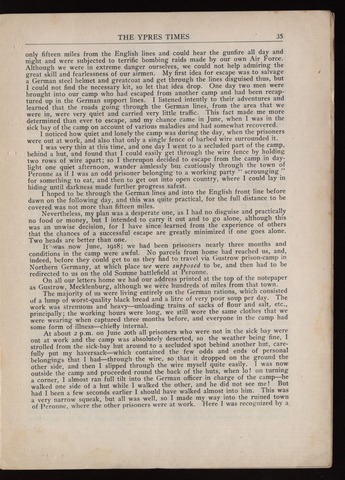THE YPRES TIMES
35
only fifteen miles from the English lines and could hear the gunfire all day and
night and were subjected to terrific bombing raids made by our own Air Force.
Although we were in extreme danger ourselves, we could not help admiring the
great skill and fearlessness of our airmen. My first idea for escape was to salvage
a German steel helmet and greatcoat and get through the lines disguised thus, but
I could not find the necessary kit, so let that idea drop. One day two men were
brought into our camp who had escaped from another camp and had been recap
tured up in the German support lines. I listened intently to their adventures and
learned that the roads going through the German lines, from the area that we
were in, were very quiet and carried very little traffic. This fact made me more
determined than ever to escape, and my chance came in June, when I was in the
sick bay of the camp on account of various maladies and had somewhat recovered.
I noticed how quiet and lonely the camp was during the day, when the prisoners
were out at work, and also that only a single fence of barbed wire surrounded it.
I was very thin at this time, and one day I went to a secluded part of the camp,
behind a hut, and found that I could easily get through the wire fence by holding
two rows of wire apart; so I thereupon decided to escape from the camp in day
light one quiet afternoon, wander aimlessly bur cautiously through the town of
Peronne as if I was an odd prisoner belonging to a working party scrounging
for something to eat, and then to get out into open country, where I could lay in
hiding until darkness made further progress safest.
I hoped to be through the German lines and into the English front line before
dawn on the following day, and this was quite practical, for the full distance to be
covered was not more than fifteen miles.
Nevertheless, my plan was a desperate one, as I had no disguise and practically
no food or money, but I intended to carry it out and to go alone, although this
was an unwise decision, for I have since learned from the experience of others
that the chances of a successful escape are greatly minimized if one goes alone.
Two heads are better than one.
It was now June, 1918; we had been prisoners nearly three months and
conditions in the camp were awful. No parcels from home had reached us, and,
indeed, before they could get to us they had to travel via Gustrow prison-camp in
Northern Germany, at which place we were supposed to be, and then had to be
redirected to us on the old Somme battlefield at Peronne.
On all our letters home we had our address printed at the top of the notepaper
as Gustrow, Mecklenburg, although we were hundreds of miles from that town.
The majority of us were living entirely on the German rations, which consisted
of a lump of worst-quality black bread and a litre of very poor soup per day. The
work was strenuous and heavyunloading trains of sacks of flour and salt, etc.,
principally; the working hours were long, we still wore the same clothes that we
were wearing when captured three months before, and everyone in the camp had
some form of illnesschiefly internal.
At about 2 p.m. on June 20th all prisoners who were not in the sick bay were
out at work and the camp was absolutely deserted, so. the weather being fine, I
strolled from the sick-bay hut around to a secluded spot behind another hut, care
fully put my haversackwhich contained the few odds and ends of personal
belongings that I hadthrough the wire, so that it dropped on the ground the
other side, and then I slipped through the wire myself quite easily. I was now
outside the camp and proceeded round the back of the huts, when loon turning
a corner, I almost ran full tilt into the German officer in charge of the camphe
walked one side of a hut while I walked the other, and he did not see meBut
had I been a few seconds earlier I should have walked almost into him. This was
a very narrow squeak, but all was well, so I made my way into the ruined town
of Peronne, where the other prisoners were at work. Here I was recognized by a

